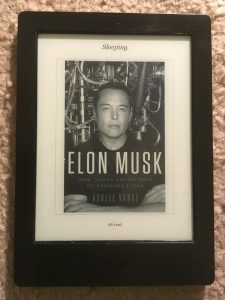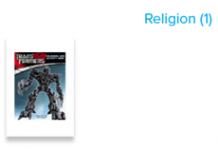 My Amazon Kindles, even the $290 Oasis, won’t do all-text bold regardless of all the pleas from me and others to jeff@amazon.com and friends.
My Amazon Kindles, even the $290 Oasis, won’t do all-text bold regardless of all the pleas from me and others to jeff@amazon.com and friends.
So shouldn’t I use my Kobo Aura H2O instead to enjoy OverDrive library books from the public library here in Alexandria, Virginia, despite the hassles of Adobe DRM? The Kobo e-reader even has a font-weight slider to adjust the level of bold.
Ah! But a nasty catch ensnares some and perhaps all Kobo e-reader owners checking out OverDrive books from libraries. The news about Adobe DRM is still dismal for them. Just as Amazon disses e-book-lovers who beg for the bold option, Adobe remains passionately apathetic about all the DRM pain inflicted on us. I don’t care about any new products maybe on the way. I’m talking about now.
The latest reminder came yesterday in my struggle to read a library copy of Elon Musk: Tesla, SpaceX, and the Quest for a Fantastic Future, by Ashlee Vance. After I updated from Adobe Digital Editions 3.0 to 4.5.1, my Kobo stubbornly refused to open up this OverDrive book “protected” with Adobe. I tried several times.
I’ll tell you how I finally succeeded, but let me interrupt with a little background. For novices who don’t know, Adobe Digital Editions runs on your desktop or laptop or other device. You use it not just to read library e-books and others but also to transfer them to your Kobo e-reader or other ADE-compatible gadget.
There is hope. OverDrive soon will let you download public library books as if they were Kobo books, just as you can now request Kindle books through OverDrive and do the actual download via Amazon. No need to go through loathsome ADE.
Meanwhile, however, as a Kobo owner and Adobe victim, I have plenty of company if I go by a quick Googling around. I think of cash-strapped public libraries. In my dream world, they could successfully sue Adobe for countless millions in tech support costs and maybe send a few executives to the electric chair along the way after good, sound waterboardings and whip-lashings (just joking). An Adobe victim told of being bounced back and forth between OverDrive and Adobe, and a second sufferer said the issue had defied the Kobo support desk.
Now here’s the kicker. The desperate dialogue mainly dated back to 2014 and involved Adobe 4.0.
Shouldn’t Adobe have fixed the problem by the time it released 4.5.1, months later? Isn’t this yet another indication of the need for consumer protection laws to safeguard us against the overzealous and sloppy implementation of DRM? Our do-nothing politicians in the U.S. won’t act without lots of prodding. But if nothing else, maybe those in Europe and elsewhere can start caring as much about Adobe and other DRM purveyors as legislative targets as they do about Amazon—whether the books involved are for sale or for library use. France is closer than the U.S. in open-mindedness but still has a long way to go.
Luckily, buried in Adobe forums, an answer to my DRM issue of the moment existed from Jader4Paul, apparently not an Adobe employee and thus free to speak the truth. Yes, we’re talking heresy here. Victimized Kobo owners should switch from Adobe Digital Editions 4 or 4.5.1, whatever, back to to 3. So I deauthorized Adobe Editions from 4.5.1 from my desktop, uninstalled it, downloaded ADE 3, authorized it, used the normal USB connection to wipe out the unreadable copy of the Elon Musk bio on my Kobo, then replaced the book with a freshly downloaded one from the Alexandria Library. Success! In replacing the earlier DRM-infested copy, I might have indulged in overkill. But better to be safe.
I suppose Adobe could always try to shift the blame for my previous travails to OverDrive or Kobo. But I won’t fall for it. Digital Editions should just work. Both OverDrive and Kobo have technical resources aplenty, and Adobe looks more inept than ever if it can’t even get Digital Editions playing well with the offerings of the big boys. On top of that, incompatibilities aren’t the only issues with Digital Editions. Adobe has had to fix Grand Canyon-sized privacy holes in the software, and, separately, its laxness enabled hackers to steal zillions of passwords.
Now—here’s an Elon Musk angle beyond the book. Adobe’s market cap is $48.46 billion, e-book incompetence notwithstanding. Musk’s personal net worth is a mere $12.3 billion, and, of course, he has Tesla, SpaceX and a few other minor distractions competing for his time and capital. Too bad. Ideally someone with Musk’s brains could buy out Adobe, keep the good people (yes, I’m confident there are many) and fire the ones responsible for disasters like the one I’ve just chronicled. Dream on. That is why we need DRM-control laws to punish the irresponsible and uncaring.
Granted, I acknowledge the current need for DRM or some other way to enforce library book expiration. But wouldn’t it be wonderful if corporations had to pay the price for releasing products as abysmal as Digital Editions, which, naturally, lacks all-text bolding in the reader mode, on top of its other shortcomings? Why have public libraries and their patrons, not to mention buyers of e-books, very much an overlapping category, had to suffer as much?
For retail books, the answer is evident. The law should require publishers and retailers not to claim to “sell” books with as problematic a technology as DRM—given all the issues ranging from future access for current owners to the ability to pass on beloved books to children and grandchildren. Also, “sellers” should be required to publicly justify, title by title, why they are not using social DRM or no DRM instead if they insist on some kind of Draconian anti-piracy measure.
Meanwhile as a pragmatist, I wish OverDrive the best of luck in what will be bypass of Adobe Digital Editions (and related DRM) for Kobo e-reader owners checking out library books. I can’t wait to be able to download the books directly to my bold-capable Kobo reader. At the same time I hope that OverDrive and its publisher partners will get serious about social DRM for retail e-books as an alternative to the toxins from Adobe.
Related: DRM nightmare: After recent upgrade, Kobo customers report losing Sony books from their libraries, by TeleRead Editor Chris Meadows. Kobo says it’s licked the problem,

































David, I don’t know how I got so lucky, but still have Adobe Digital Editions 2.0 on my Mac. Before 2.0, I had massive problems with ADE. It often would not recognize a device which it previously had recognized. I still think it is a royal pain in comparison with getting Kindle books, and I look forward to Overdrive solving the problem in the near future. Fortunately most of the library books are available in Kindle format, but not all.
@Mary: Yes, hold on to 2.0 for your dear life, and meanwhile we’ll root for OverDrive to succeed with its ADE bypass for Kobo e-reader owners! I need to catch up with OverDrive. Could it arrange for other makers of devices to do direct downloading for library use through the usual store arrangements? Best of all, looking beyond DRM, how about searching for library books within your e-reader’s interface? Who knows? Maybe that feature is already on the way from OverDrive.
As long as most books are available in Kindle format, I’m good. It’s just the rare one that is not which causes me to engage with Adobe Digital Editions.
Personally, I’ve stuck with ADE 3.0 because I didn’t want to take the chance that ADE might decide to tell Adobe what e-books I’m reading, which is really none of their business. So that’s a problem I wouldn’t have.
My predictions for the near future. …
At some point soon, Kobo will drop support for Adobe DRM. After all, they have to pay tens of thousands of dollars for the Adobe server, plus pay adobe a cut of all books downloaded.. ridiculous.
Once Kobo limits drm books to kobo devices or apps, via Kobo’s own DRM, it won’t be long before Adobe shuts down Digital Editions, leaving all the rest of the e-book sellers (and customers) high and dry. (Unless Google is willing to buy it outright to keep Google Play books working. But Google hasn’t exactly been investing in Play books.)
@Rashkae: Hmm. Sounds like a great opening for social DRM, if publishers and retailers are smart about it. Same for Google wising up. Books with social DRM baked in can work on a variety of platforms. BooXtream-watermarked books, from what I’ve heard, can even work in the Kindle store. As for owners of Adobe DRMed books being left high and dry, I don’t know if that would happen, and I hope it doesn’t, but if it does, that will be yet more evidence that publishers need to break the encryption-based DRM habit.
Anyone who cares about compatibility with reading apps and devices should just use ADE 2.01. It’s still available for download on Adobe’s site. Any later versions can use a newer drm that is not compatible with most eink devices and epub apps. This new drm has been activated in some small stores(non US stores) and people can’t read on the device or app they want to.
Also, if they ever start using the new drm and you get it by downloading using 3.0 or higher
you can never get another copy with the old drm. They have it set up so
that once a book is downloaded with the new drm it can never be downloaded
with the old drm. 2.01 is all I will use.
Purple Lady: Thanks for the further info!